DECU4015: Developing an Enterprise Culture: Report and Analysis
VerifiedAdded on 2022/11/24
|11
|3059
|401
Report
AI Summary
This report delves into the concept of enterprise culture, emphasizing its significance in enhancing organizational performance and fostering employee satisfaction. It begins with an executive summary, followed by an introduction outlining the core elements of enterprise culture, such as value formation, employee empowerment, and accountability. A thorough literature review synthesizes insights from various sources, highlighting the impact of enterprise culture on human resources, consumer behavior, and overall business success. The report then presents a detailed case study of Artisan Roast, a Scottish coffee roastery, examining its unique approach to quality, service, and employee relations. Analysis of the case study reveals how Artisan Roast's enterprise culture contributes to its success, including employee engagement, low turnover rates, and a focus on employee development. The report concludes by reinforcing the vital role of enterprise culture in organizational development and expansion, underscoring the importance of aligning employee interests with business objectives.

Developing enterprise culture
Paraphrase This Document
Need a fresh take? Get an instant paraphrase of this document with our AI Paraphraser
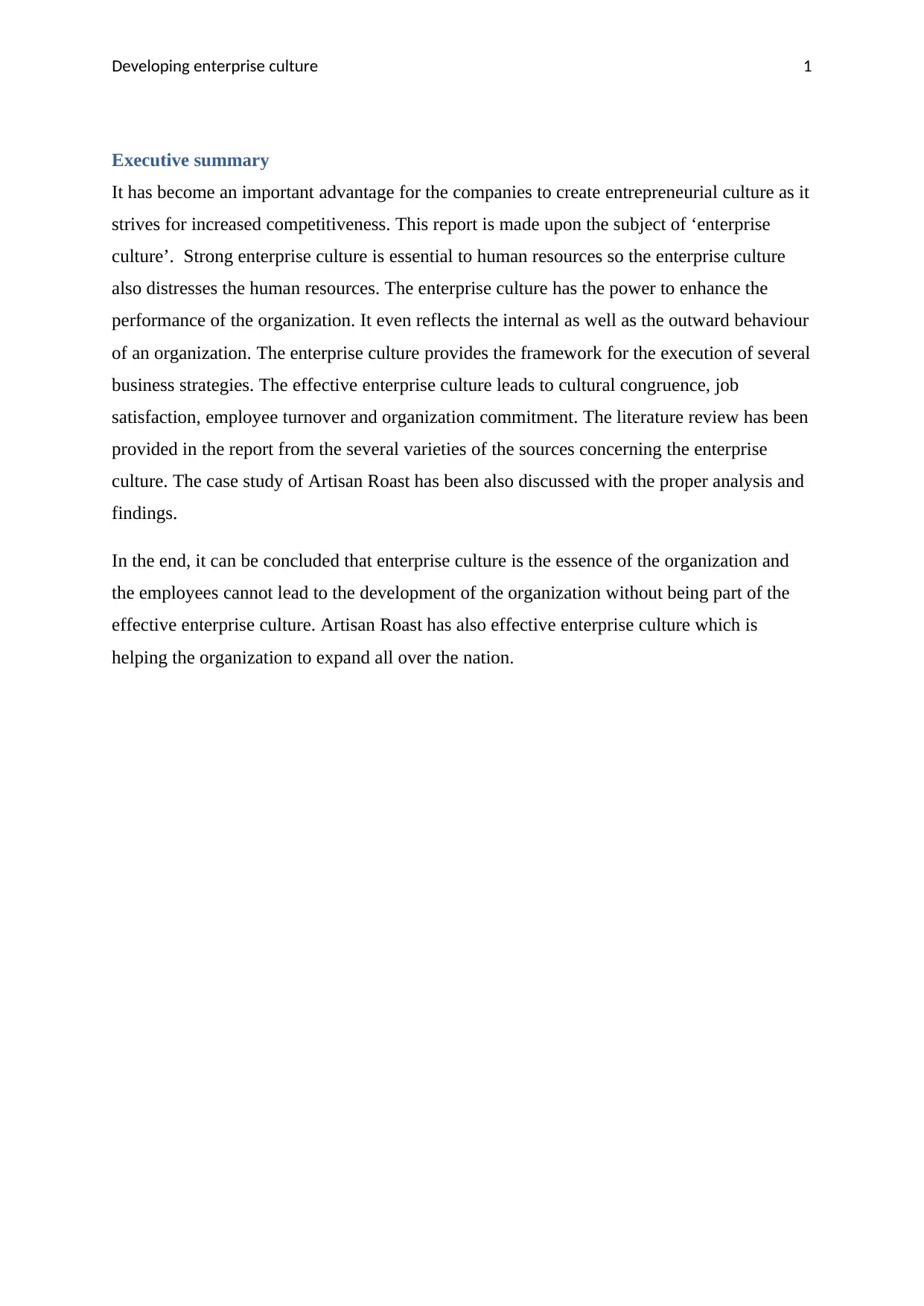
Developing enterprise culture 1
Executive summary
It has become an important advantage for the companies to create entrepreneurial culture as it
strives for increased competitiveness. This report is made upon the subject of ‘enterprise
culture’. Strong enterprise culture is essential to human resources so the enterprise culture
also distresses the human resources. The enterprise culture has the power to enhance the
performance of the organization. It even reflects the internal as well as the outward behaviour
of an organization. The enterprise culture provides the framework for the execution of several
business strategies. The effective enterprise culture leads to cultural congruence, job
satisfaction, employee turnover and organization commitment. The literature review has been
provided in the report from the several varieties of the sources concerning the enterprise
culture. The case study of Artisan Roast has been also discussed with the proper analysis and
findings.
In the end, it can be concluded that enterprise culture is the essence of the organization and
the employees cannot lead to the development of the organization without being part of the
effective enterprise culture. Artisan Roast has also effective enterprise culture which is
helping the organization to expand all over the nation.
Executive summary
It has become an important advantage for the companies to create entrepreneurial culture as it
strives for increased competitiveness. This report is made upon the subject of ‘enterprise
culture’. Strong enterprise culture is essential to human resources so the enterprise culture
also distresses the human resources. The enterprise culture has the power to enhance the
performance of the organization. It even reflects the internal as well as the outward behaviour
of an organization. The enterprise culture provides the framework for the execution of several
business strategies. The effective enterprise culture leads to cultural congruence, job
satisfaction, employee turnover and organization commitment. The literature review has been
provided in the report from the several varieties of the sources concerning the enterprise
culture. The case study of Artisan Roast has been also discussed with the proper analysis and
findings.
In the end, it can be concluded that enterprise culture is the essence of the organization and
the employees cannot lead to the development of the organization without being part of the
effective enterprise culture. Artisan Roast has also effective enterprise culture which is
helping the organization to expand all over the nation.
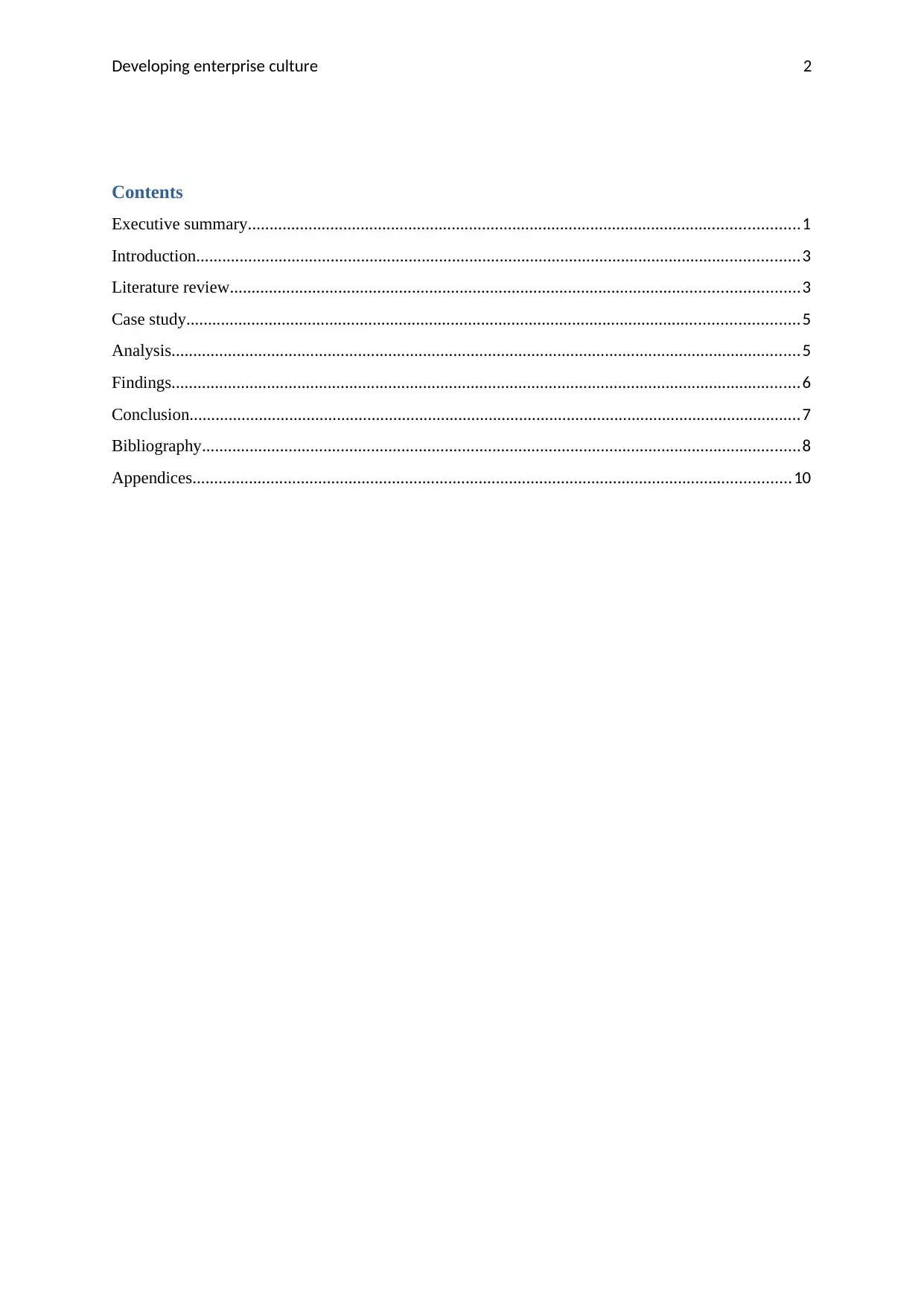
Developing enterprise culture 2
Contents
Executive summary...............................................................................................................................1
Introduction...........................................................................................................................................3
Literature review...................................................................................................................................3
Case study.............................................................................................................................................5
Analysis.................................................................................................................................................5
Findings.................................................................................................................................................6
Conclusion.............................................................................................................................................7
Bibliography..........................................................................................................................................8
Appendices..........................................................................................................................................10
Contents
Executive summary...............................................................................................................................1
Introduction...........................................................................................................................................3
Literature review...................................................................................................................................3
Case study.............................................................................................................................................5
Analysis.................................................................................................................................................5
Findings.................................................................................................................................................6
Conclusion.............................................................................................................................................7
Bibliography..........................................................................................................................................8
Appendices..........................................................................................................................................10
⊘ This is a preview!⊘
Do you want full access?
Subscribe today to unlock all pages.

Trusted by 1+ million students worldwide
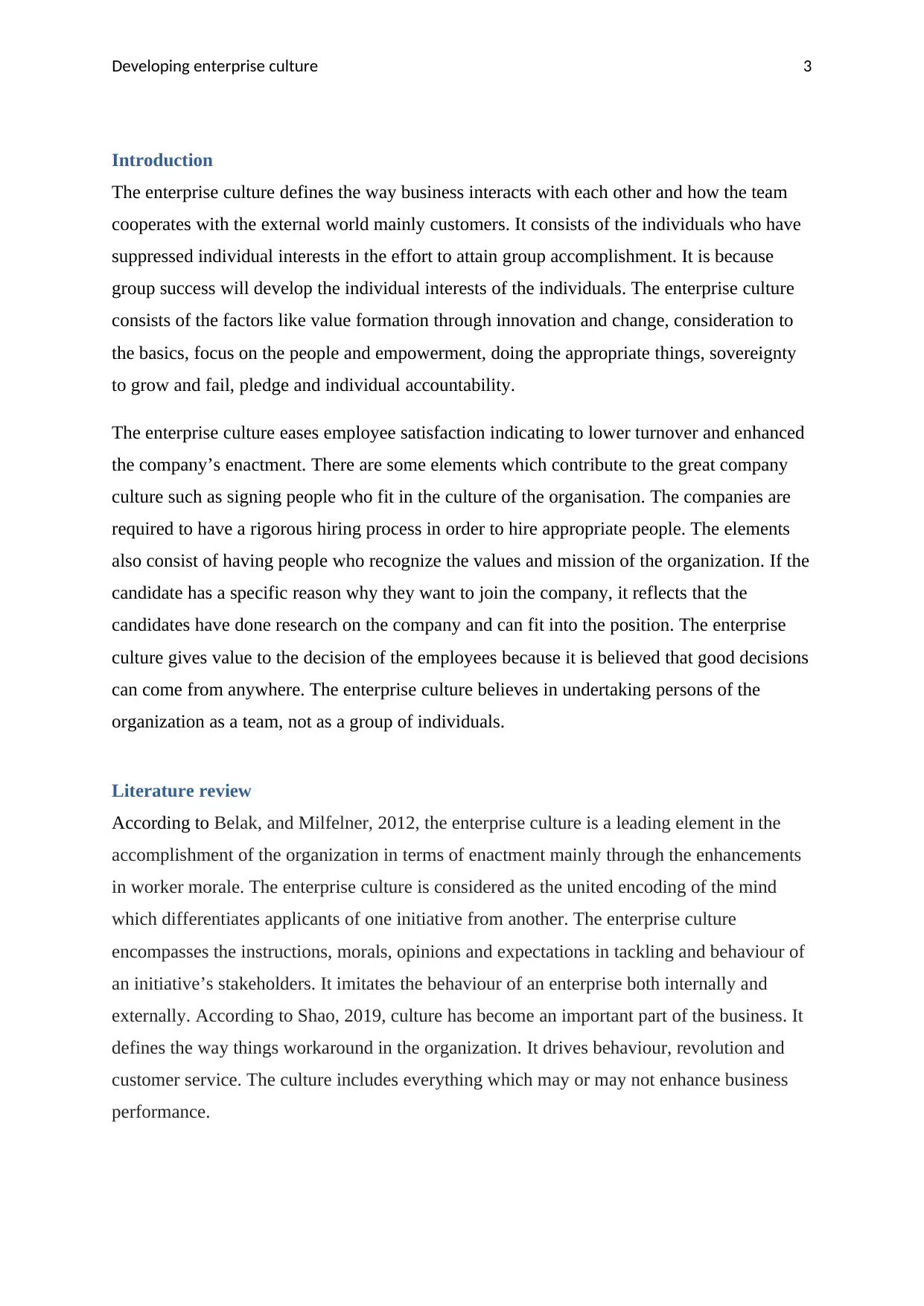
Developing enterprise culture 3
Introduction
The enterprise culture defines the way business interacts with each other and how the team
cooperates with the external world mainly customers. It consists of the individuals who have
suppressed individual interests in the effort to attain group accomplishment. It is because
group success will develop the individual interests of the individuals. The enterprise culture
consists of the factors like value formation through innovation and change, consideration to
the basics, focus on the people and empowerment, doing the appropriate things, sovereignty
to grow and fail, pledge and individual accountability.
The enterprise culture eases employee satisfaction indicating to lower turnover and enhanced
the company’s enactment. There are some elements which contribute to the great company
culture such as signing people who fit in the culture of the organisation. The companies are
required to have a rigorous hiring process in order to hire appropriate people. The elements
also consist of having people who recognize the values and mission of the organization. If the
candidate has a specific reason why they want to join the company, it reflects that the
candidates have done research on the company and can fit into the position. The enterprise
culture gives value to the decision of the employees because it is believed that good decisions
can come from anywhere. The enterprise culture believes in undertaking persons of the
organization as a team, not as a group of individuals.
Literature review
According to Belak, and Milfelner, 2012, the enterprise culture is a leading element in the
accomplishment of the organization in terms of enactment mainly through the enhancements
in worker morale. The enterprise culture is considered as the united encoding of the mind
which differentiates applicants of one initiative from another. The enterprise culture
encompasses the instructions, morals, opinions and expectations in tackling and behaviour of
an initiative’s stakeholders. It imitates the behaviour of an enterprise both internally and
externally. According to Shao, 2019, culture has become an important part of the business. It
defines the way things workaround in the organization. It drives behaviour, revolution and
customer service. The culture includes everything which may or may not enhance business
performance.
Introduction
The enterprise culture defines the way business interacts with each other and how the team
cooperates with the external world mainly customers. It consists of the individuals who have
suppressed individual interests in the effort to attain group accomplishment. It is because
group success will develop the individual interests of the individuals. The enterprise culture
consists of the factors like value formation through innovation and change, consideration to
the basics, focus on the people and empowerment, doing the appropriate things, sovereignty
to grow and fail, pledge and individual accountability.
The enterprise culture eases employee satisfaction indicating to lower turnover and enhanced
the company’s enactment. There are some elements which contribute to the great company
culture such as signing people who fit in the culture of the organisation. The companies are
required to have a rigorous hiring process in order to hire appropriate people. The elements
also consist of having people who recognize the values and mission of the organization. If the
candidate has a specific reason why they want to join the company, it reflects that the
candidates have done research on the company and can fit into the position. The enterprise
culture gives value to the decision of the employees because it is believed that good decisions
can come from anywhere. The enterprise culture believes in undertaking persons of the
organization as a team, not as a group of individuals.
Literature review
According to Belak, and Milfelner, 2012, the enterprise culture is a leading element in the
accomplishment of the organization in terms of enactment mainly through the enhancements
in worker morale. The enterprise culture is considered as the united encoding of the mind
which differentiates applicants of one initiative from another. The enterprise culture
encompasses the instructions, morals, opinions and expectations in tackling and behaviour of
an initiative’s stakeholders. It imitates the behaviour of an enterprise both internally and
externally. According to Shao, 2019, culture has become an important part of the business. It
defines the way things workaround in the organization. It drives behaviour, revolution and
customer service. The culture includes everything which may or may not enhance business
performance.
Paraphrase This Document
Need a fresh take? Get an instant paraphrase of this document with our AI Paraphraser
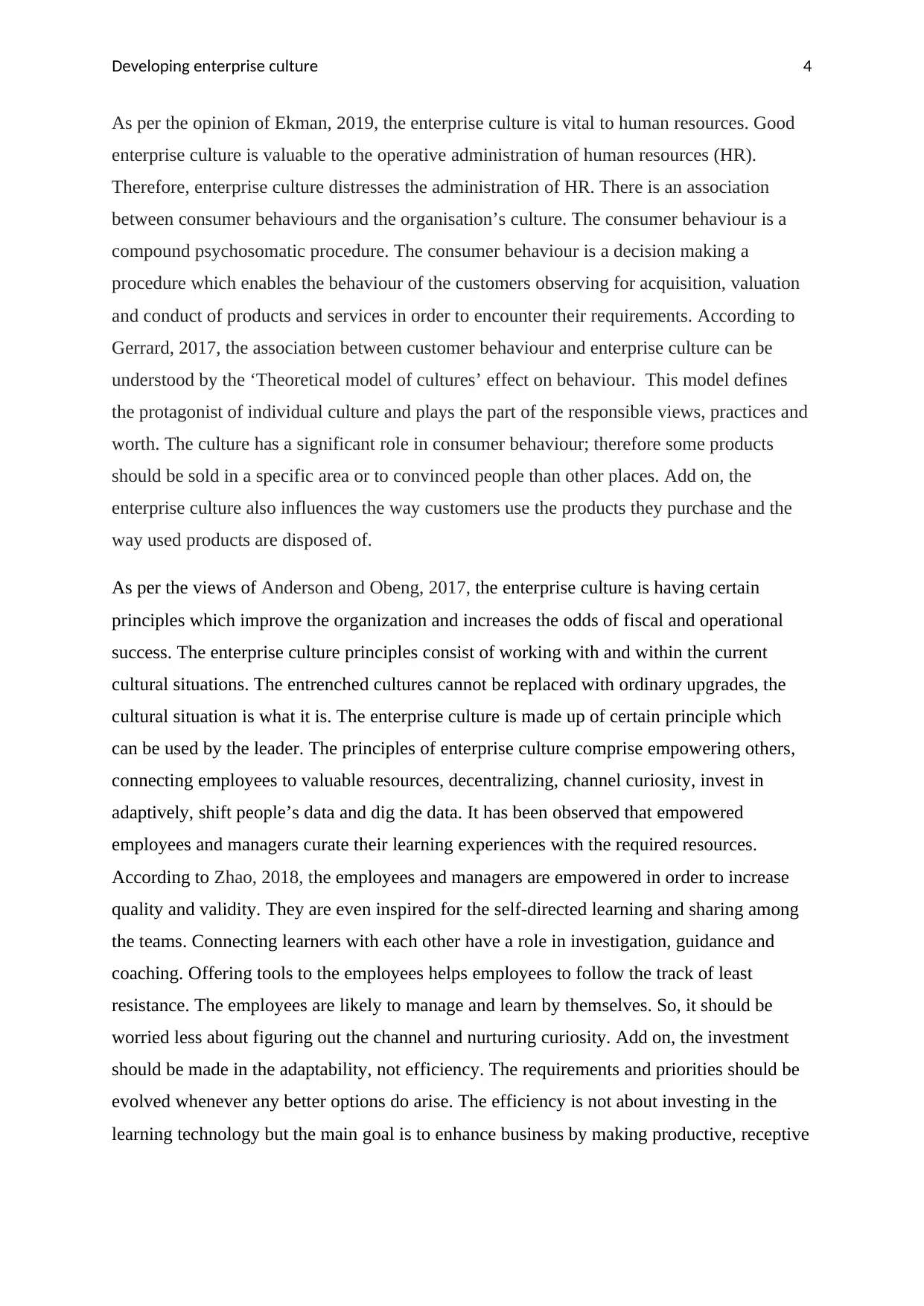
Developing enterprise culture 4
As per the opinion of Ekman, 2019, the enterprise culture is vital to human resources. Good
enterprise culture is valuable to the operative administration of human resources (HR).
Therefore, enterprise culture distresses the administration of HR. There is an association
between consumer behaviours and the organisation’s culture. The consumer behaviour is a
compound psychosomatic procedure. The consumer behaviour is a decision making a
procedure which enables the behaviour of the customers observing for acquisition, valuation
and conduct of products and services in order to encounter their requirements. According to
Gerrard, 2017, the association between customer behaviour and enterprise culture can be
understood by the ‘Theoretical model of cultures’ effect on behaviour. This model defines
the protagonist of individual culture and plays the part of the responsible views, practices and
worth. The culture has a significant role in consumer behaviour; therefore some products
should be sold in a specific area or to convinced people than other places. Add on, the
enterprise culture also influences the way customers use the products they purchase and the
way used products are disposed of.
As per the views of Anderson and Obeng, 2017, the enterprise culture is having certain
principles which improve the organization and increases the odds of fiscal and operational
success. The enterprise culture principles consist of working with and within the current
cultural situations. The entrenched cultures cannot be replaced with ordinary upgrades, the
cultural situation is what it is. The enterprise culture is made up of certain principle which
can be used by the leader. The principles of enterprise culture comprise empowering others,
connecting employees to valuable resources, decentralizing, channel curiosity, invest in
adaptively, shift people’s data and dig the data. It has been observed that empowered
employees and managers curate their learning experiences with the required resources.
According to Zhao, 2018, the employees and managers are empowered in order to increase
quality and validity. They are even inspired for the self-directed learning and sharing among
the teams. Connecting learners with each other have a role in investigation, guidance and
coaching. Offering tools to the employees helps employees to follow the track of least
resistance. The employees are likely to manage and learn by themselves. So, it should be
worried less about figuring out the channel and nurturing curiosity. Add on, the investment
should be made in the adaptability, not efficiency. The requirements and priorities should be
evolved whenever any better options do arise. The efficiency is not about investing in the
learning technology but the main goal is to enhance business by making productive, receptive
As per the opinion of Ekman, 2019, the enterprise culture is vital to human resources. Good
enterprise culture is valuable to the operative administration of human resources (HR).
Therefore, enterprise culture distresses the administration of HR. There is an association
between consumer behaviours and the organisation’s culture. The consumer behaviour is a
compound psychosomatic procedure. The consumer behaviour is a decision making a
procedure which enables the behaviour of the customers observing for acquisition, valuation
and conduct of products and services in order to encounter their requirements. According to
Gerrard, 2017, the association between customer behaviour and enterprise culture can be
understood by the ‘Theoretical model of cultures’ effect on behaviour. This model defines
the protagonist of individual culture and plays the part of the responsible views, practices and
worth. The culture has a significant role in consumer behaviour; therefore some products
should be sold in a specific area or to convinced people than other places. Add on, the
enterprise culture also influences the way customers use the products they purchase and the
way used products are disposed of.
As per the views of Anderson and Obeng, 2017, the enterprise culture is having certain
principles which improve the organization and increases the odds of fiscal and operational
success. The enterprise culture principles consist of working with and within the current
cultural situations. The entrenched cultures cannot be replaced with ordinary upgrades, the
cultural situation is what it is. The enterprise culture is made up of certain principle which
can be used by the leader. The principles of enterprise culture comprise empowering others,
connecting employees to valuable resources, decentralizing, channel curiosity, invest in
adaptively, shift people’s data and dig the data. It has been observed that empowered
employees and managers curate their learning experiences with the required resources.
According to Zhao, 2018, the employees and managers are empowered in order to increase
quality and validity. They are even inspired for the self-directed learning and sharing among
the teams. Connecting learners with each other have a role in investigation, guidance and
coaching. Offering tools to the employees helps employees to follow the track of least
resistance. The employees are likely to manage and learn by themselves. So, it should be
worried less about figuring out the channel and nurturing curiosity. Add on, the investment
should be made in the adaptability, not efficiency. The requirements and priorities should be
evolved whenever any better options do arise. The efficiency is not about investing in the
learning technology but the main goal is to enhance business by making productive, receptive
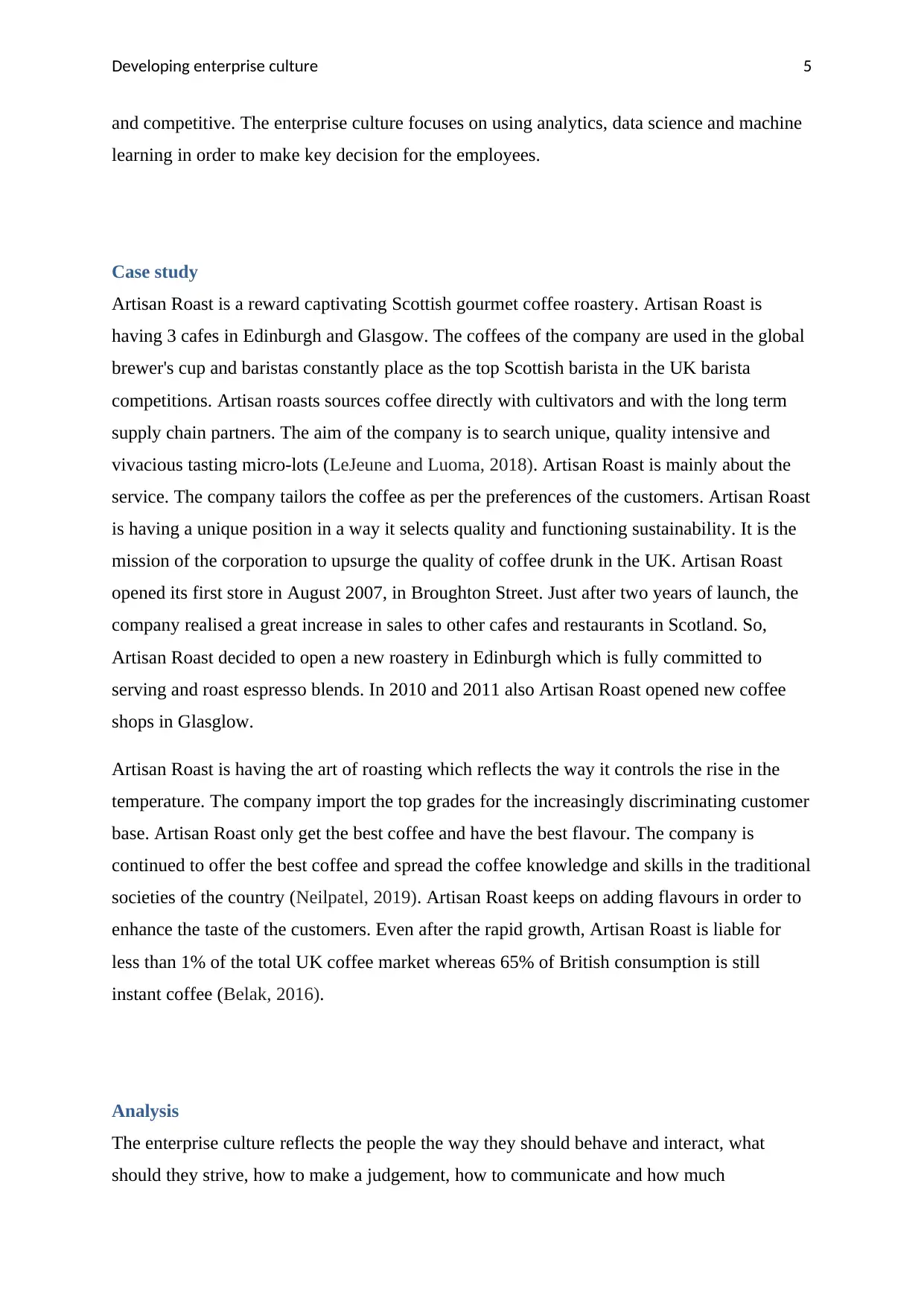
Developing enterprise culture 5
and competitive. The enterprise culture focuses on using analytics, data science and machine
learning in order to make key decision for the employees.
Case study
Artisan Roast is a reward captivating Scottish gourmet coffee roastery. Artisan Roast is
having 3 cafes in Edinburgh and Glasgow. The coffees of the company are used in the global
brewer's cup and baristas constantly place as the top Scottish barista in the UK barista
competitions. Artisan roasts sources coffee directly with cultivators and with the long term
supply chain partners. The aim of the company is to search unique, quality intensive and
vivacious tasting micro-lots (LeJeune and Luoma, 2018). Artisan Roast is mainly about the
service. The company tailors the coffee as per the preferences of the customers. Artisan Roast
is having a unique position in a way it selects quality and functioning sustainability. It is the
mission of the corporation to upsurge the quality of coffee drunk in the UK. Artisan Roast
opened its first store in August 2007, in Broughton Street. Just after two years of launch, the
company realised a great increase in sales to other cafes and restaurants in Scotland. So,
Artisan Roast decided to open a new roastery in Edinburgh which is fully committed to
serving and roast espresso blends. In 2010 and 2011 also Artisan Roast opened new coffee
shops in Glasglow.
Artisan Roast is having the art of roasting which reflects the way it controls the rise in the
temperature. The company import the top grades for the increasingly discriminating customer
base. Artisan Roast only get the best coffee and have the best flavour. The company is
continued to offer the best coffee and spread the coffee knowledge and skills in the traditional
societies of the country (Neilpatel, 2019). Artisan Roast keeps on adding flavours in order to
enhance the taste of the customers. Even after the rapid growth, Artisan Roast is liable for
less than 1% of the total UK coffee market whereas 65% of British consumption is still
instant coffee (Belak, 2016).
Analysis
The enterprise culture reflects the people the way they should behave and interact, what
should they strive, how to make a judgement, how to communicate and how much
and competitive. The enterprise culture focuses on using analytics, data science and machine
learning in order to make key decision for the employees.
Case study
Artisan Roast is a reward captivating Scottish gourmet coffee roastery. Artisan Roast is
having 3 cafes in Edinburgh and Glasgow. The coffees of the company are used in the global
brewer's cup and baristas constantly place as the top Scottish barista in the UK barista
competitions. Artisan roasts sources coffee directly with cultivators and with the long term
supply chain partners. The aim of the company is to search unique, quality intensive and
vivacious tasting micro-lots (LeJeune and Luoma, 2018). Artisan Roast is mainly about the
service. The company tailors the coffee as per the preferences of the customers. Artisan Roast
is having a unique position in a way it selects quality and functioning sustainability. It is the
mission of the corporation to upsurge the quality of coffee drunk in the UK. Artisan Roast
opened its first store in August 2007, in Broughton Street. Just after two years of launch, the
company realised a great increase in sales to other cafes and restaurants in Scotland. So,
Artisan Roast decided to open a new roastery in Edinburgh which is fully committed to
serving and roast espresso blends. In 2010 and 2011 also Artisan Roast opened new coffee
shops in Glasglow.
Artisan Roast is having the art of roasting which reflects the way it controls the rise in the
temperature. The company import the top grades for the increasingly discriminating customer
base. Artisan Roast only get the best coffee and have the best flavour. The company is
continued to offer the best coffee and spread the coffee knowledge and skills in the traditional
societies of the country (Neilpatel, 2019). Artisan Roast keeps on adding flavours in order to
enhance the taste of the customers. Even after the rapid growth, Artisan Roast is liable for
less than 1% of the total UK coffee market whereas 65% of British consumption is still
instant coffee (Belak, 2016).
Analysis
The enterprise culture reflects the people the way they should behave and interact, what
should they strive, how to make a judgement, how to communicate and how much
⊘ This is a preview!⊘
Do you want full access?
Subscribe today to unlock all pages.

Trusted by 1+ million students worldwide
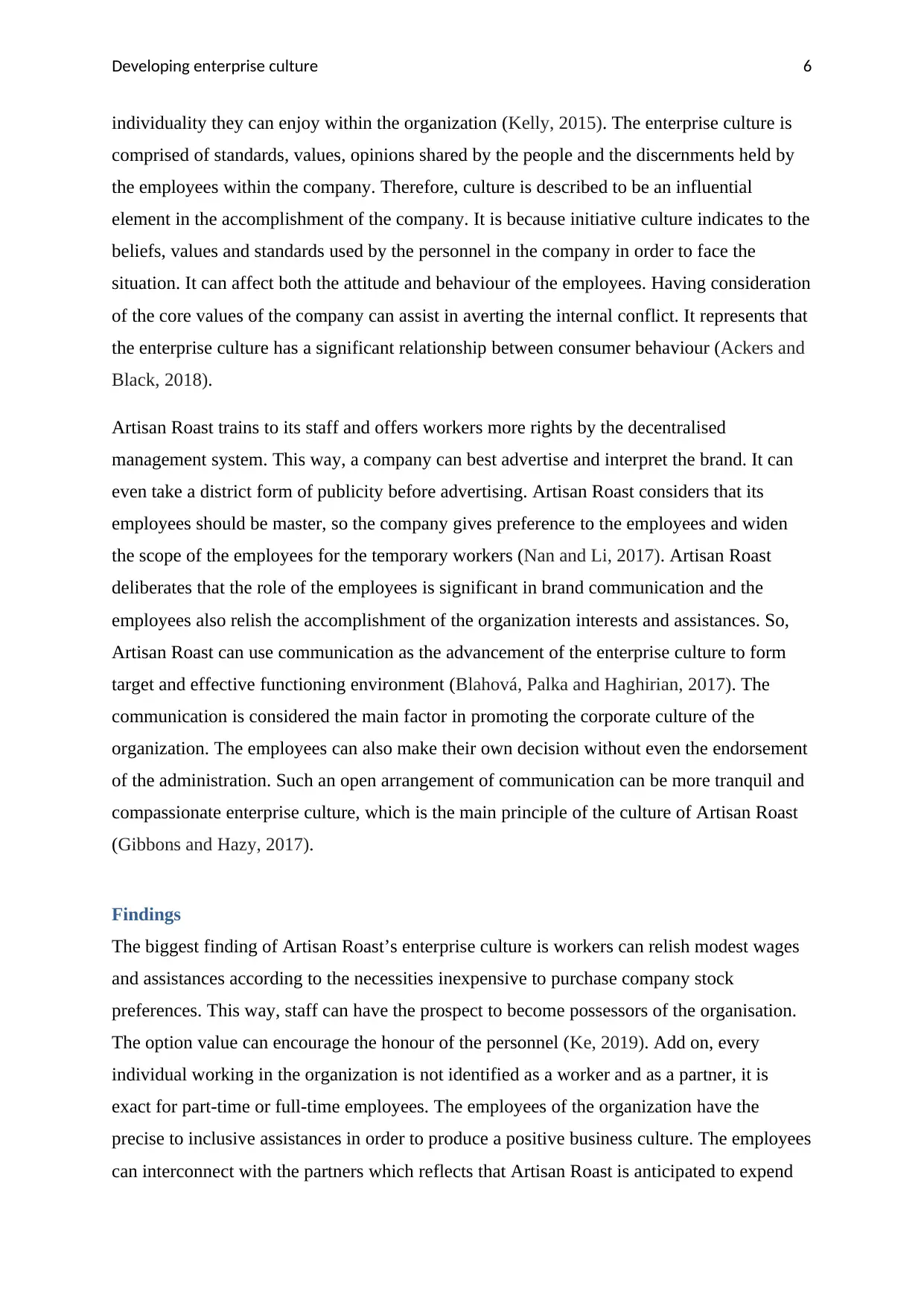
Developing enterprise culture 6
individuality they can enjoy within the organization (Kelly, 2015). The enterprise culture is
comprised of standards, values, opinions shared by the people and the discernments held by
the employees within the company. Therefore, culture is described to be an influential
element in the accomplishment of the company. It is because initiative culture indicates to the
beliefs, values and standards used by the personnel in the company in order to face the
situation. It can affect both the attitude and behaviour of the employees. Having consideration
of the core values of the company can assist in averting the internal conflict. It represents that
the enterprise culture has a significant relationship between consumer behaviour (Ackers and
Black, 2018).
Artisan Roast trains to its staff and offers workers more rights by the decentralised
management system. This way, a company can best advertise and interpret the brand. It can
even take a district form of publicity before advertising. Artisan Roast considers that its
employees should be master, so the company gives preference to the employees and widen
the scope of the employees for the temporary workers (Nan and Li, 2017). Artisan Roast
deliberates that the role of the employees is significant in brand communication and the
employees also relish the accomplishment of the organization interests and assistances. So,
Artisan Roast can use communication as the advancement of the enterprise culture to form
target and effective functioning environment (Blahová, Palka and Haghirian, 2017). The
communication is considered the main factor in promoting the corporate culture of the
organization. The employees can also make their own decision without even the endorsement
of the administration. Such an open arrangement of communication can be more tranquil and
compassionate enterprise culture, which is the main principle of the culture of Artisan Roast
(Gibbons and Hazy, 2017).
Findings
The biggest finding of Artisan Roast’s enterprise culture is workers can relish modest wages
and assistances according to the necessities inexpensive to purchase company stock
preferences. This way, staff can have the prospect to become possessors of the organisation.
The option value can encourage the honour of the personnel (Ke, 2019). Add on, every
individual working in the organization is not identified as a worker and as a partner, it is
exact for part-time or full-time employees. The employees of the organization have the
precise to inclusive assistances in order to produce a positive business culture. The employees
can interconnect with the partners which reflects that Artisan Roast is anticipated to expend
individuality they can enjoy within the organization (Kelly, 2015). The enterprise culture is
comprised of standards, values, opinions shared by the people and the discernments held by
the employees within the company. Therefore, culture is described to be an influential
element in the accomplishment of the company. It is because initiative culture indicates to the
beliefs, values and standards used by the personnel in the company in order to face the
situation. It can affect both the attitude and behaviour of the employees. Having consideration
of the core values of the company can assist in averting the internal conflict. It represents that
the enterprise culture has a significant relationship between consumer behaviour (Ackers and
Black, 2018).
Artisan Roast trains to its staff and offers workers more rights by the decentralised
management system. This way, a company can best advertise and interpret the brand. It can
even take a district form of publicity before advertising. Artisan Roast considers that its
employees should be master, so the company gives preference to the employees and widen
the scope of the employees for the temporary workers (Nan and Li, 2017). Artisan Roast
deliberates that the role of the employees is significant in brand communication and the
employees also relish the accomplishment of the organization interests and assistances. So,
Artisan Roast can use communication as the advancement of the enterprise culture to form
target and effective functioning environment (Blahová, Palka and Haghirian, 2017). The
communication is considered the main factor in promoting the corporate culture of the
organization. The employees can also make their own decision without even the endorsement
of the administration. Such an open arrangement of communication can be more tranquil and
compassionate enterprise culture, which is the main principle of the culture of Artisan Roast
(Gibbons and Hazy, 2017).
Findings
The biggest finding of Artisan Roast’s enterprise culture is workers can relish modest wages
and assistances according to the necessities inexpensive to purchase company stock
preferences. This way, staff can have the prospect to become possessors of the organisation.
The option value can encourage the honour of the personnel (Ke, 2019). Add on, every
individual working in the organization is not identified as a worker and as a partner, it is
exact for part-time or full-time employees. The employees of the organization have the
precise to inclusive assistances in order to produce a positive business culture. The employees
can interconnect with the partners which reflects that Artisan Roast is anticipated to expend
Paraphrase This Document
Need a fresh take? Get an instant paraphrase of this document with our AI Paraphraser
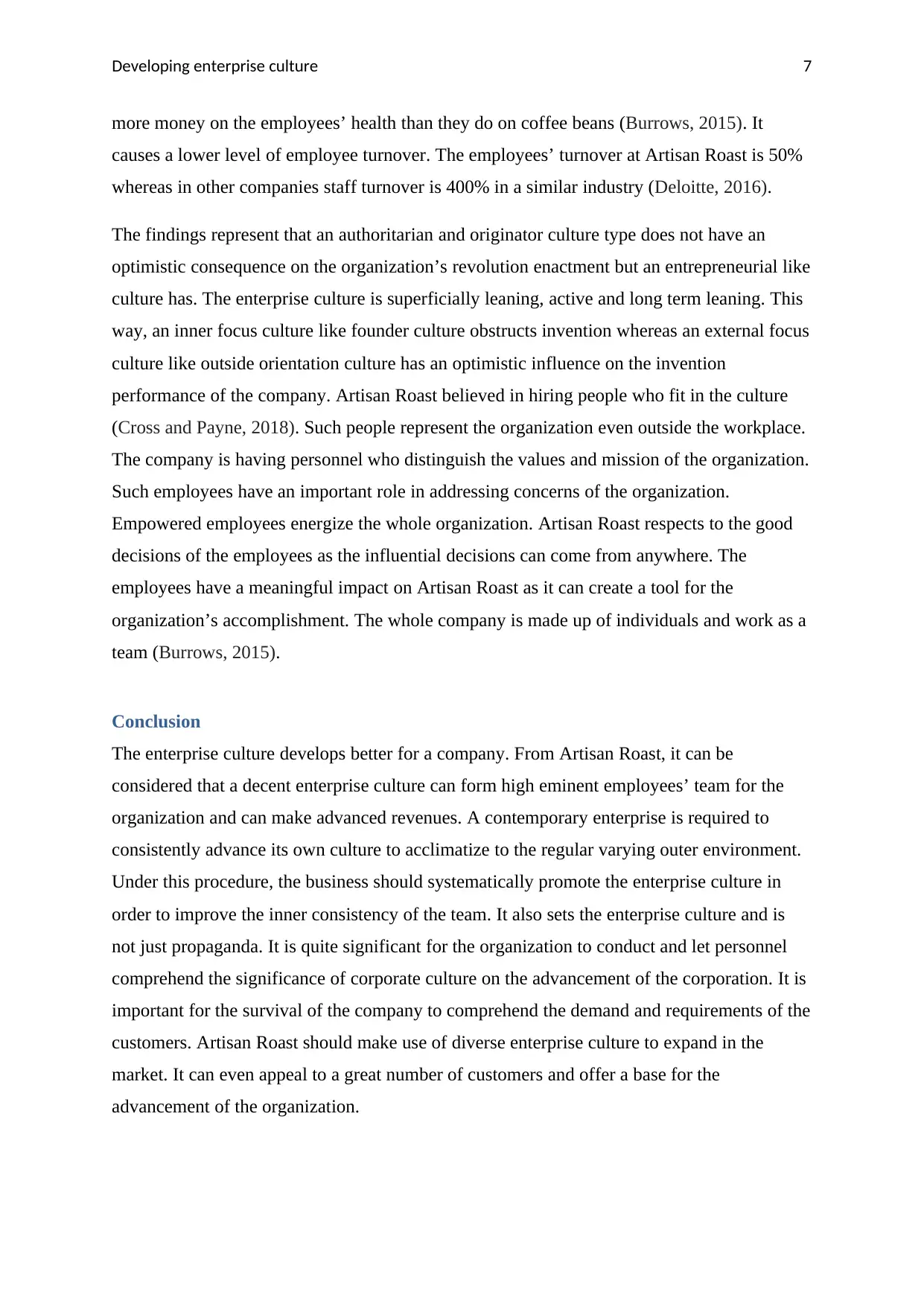
Developing enterprise culture 7
more money on the employees’ health than they do on coffee beans (Burrows, 2015). It
causes a lower level of employee turnover. The employees’ turnover at Artisan Roast is 50%
whereas in other companies staff turnover is 400% in a similar industry (Deloitte, 2016).
The findings represent that an authoritarian and originator culture type does not have an
optimistic consequence on the organization’s revolution enactment but an entrepreneurial like
culture has. The enterprise culture is superficially leaning, active and long term leaning. This
way, an inner focus culture like founder culture obstructs invention whereas an external focus
culture like outside orientation culture has an optimistic influence on the invention
performance of the company. Artisan Roast believed in hiring people who fit in the culture
(Cross and Payne, 2018). Such people represent the organization even outside the workplace.
The company is having personnel who distinguish the values and mission of the organization.
Such employees have an important role in addressing concerns of the organization.
Empowered employees energize the whole organization. Artisan Roast respects to the good
decisions of the employees as the influential decisions can come from anywhere. The
employees have a meaningful impact on Artisan Roast as it can create a tool for the
organization’s accomplishment. The whole company is made up of individuals and work as a
team (Burrows, 2015).
Conclusion
The enterprise culture develops better for a company. From Artisan Roast, it can be
considered that a decent enterprise culture can form high eminent employees’ team for the
organization and can make advanced revenues. A contemporary enterprise is required to
consistently advance its own culture to acclimatize to the regular varying outer environment.
Under this procedure, the business should systematically promote the enterprise culture in
order to improve the inner consistency of the team. It also sets the enterprise culture and is
not just propaganda. It is quite significant for the organization to conduct and let personnel
comprehend the significance of corporate culture on the advancement of the corporation. It is
important for the survival of the company to comprehend the demand and requirements of the
customers. Artisan Roast should make use of diverse enterprise culture to expand in the
market. It can even appeal to a great number of customers and offer a base for the
advancement of the organization.
more money on the employees’ health than they do on coffee beans (Burrows, 2015). It
causes a lower level of employee turnover. The employees’ turnover at Artisan Roast is 50%
whereas in other companies staff turnover is 400% in a similar industry (Deloitte, 2016).
The findings represent that an authoritarian and originator culture type does not have an
optimistic consequence on the organization’s revolution enactment but an entrepreneurial like
culture has. The enterprise culture is superficially leaning, active and long term leaning. This
way, an inner focus culture like founder culture obstructs invention whereas an external focus
culture like outside orientation culture has an optimistic influence on the invention
performance of the company. Artisan Roast believed in hiring people who fit in the culture
(Cross and Payne, 2018). Such people represent the organization even outside the workplace.
The company is having personnel who distinguish the values and mission of the organization.
Such employees have an important role in addressing concerns of the organization.
Empowered employees energize the whole organization. Artisan Roast respects to the good
decisions of the employees as the influential decisions can come from anywhere. The
employees have a meaningful impact on Artisan Roast as it can create a tool for the
organization’s accomplishment. The whole company is made up of individuals and work as a
team (Burrows, 2015).
Conclusion
The enterprise culture develops better for a company. From Artisan Roast, it can be
considered that a decent enterprise culture can form high eminent employees’ team for the
organization and can make advanced revenues. A contemporary enterprise is required to
consistently advance its own culture to acclimatize to the regular varying outer environment.
Under this procedure, the business should systematically promote the enterprise culture in
order to improve the inner consistency of the team. It also sets the enterprise culture and is
not just propaganda. It is quite significant for the organization to conduct and let personnel
comprehend the significance of corporate culture on the advancement of the corporation. It is
important for the survival of the company to comprehend the demand and requirements of the
customers. Artisan Roast should make use of diverse enterprise culture to expand in the
market. It can even appeal to a great number of customers and offer a base for the
advancement of the organization.
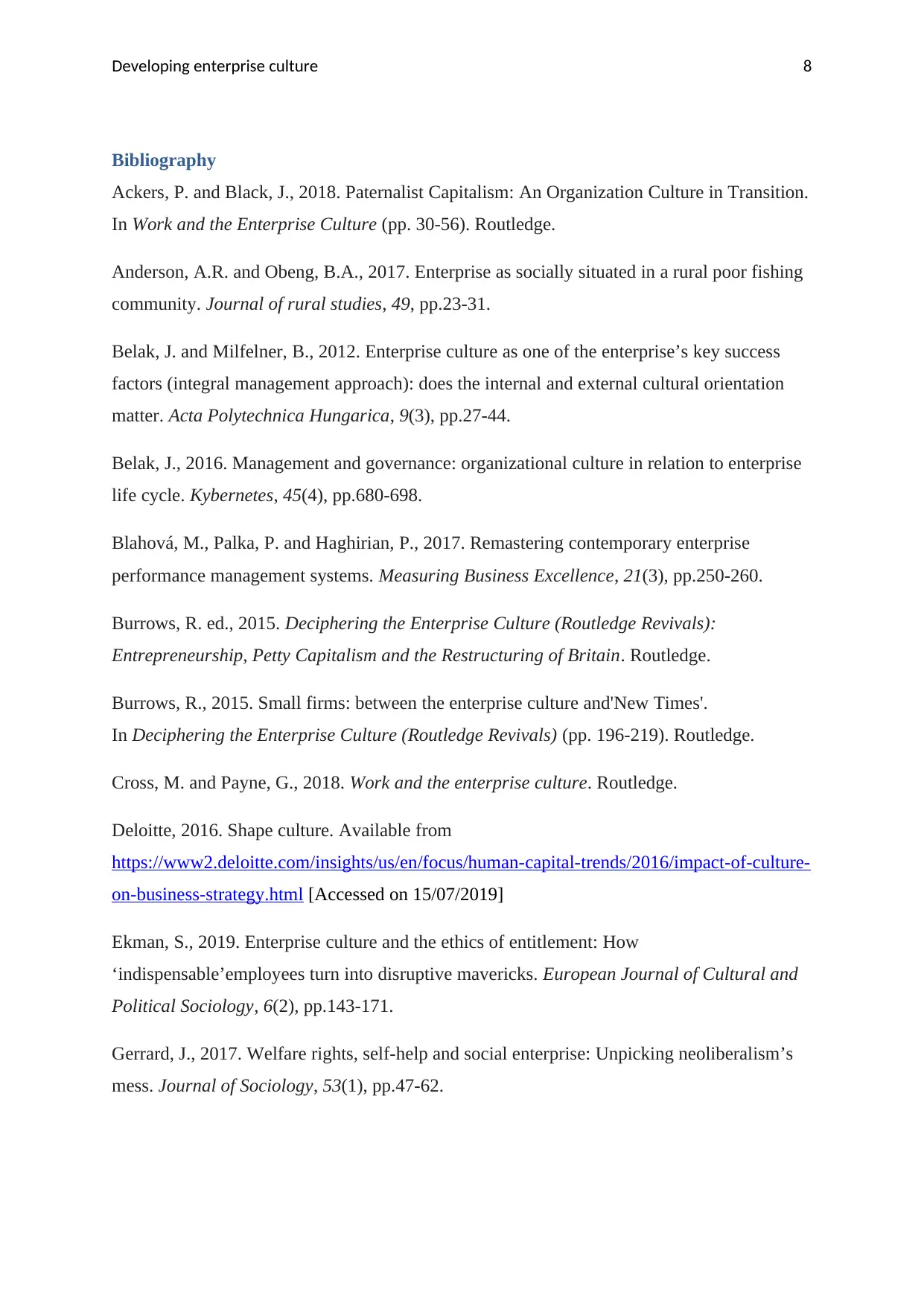
Developing enterprise culture 8
Bibliography
Ackers, P. and Black, J., 2018. Paternalist Capitalism: An Organization Culture in Transition.
In Work and the Enterprise Culture (pp. 30-56). Routledge.
Anderson, A.R. and Obeng, B.A., 2017. Enterprise as socially situated in a rural poor fishing
community. Journal of rural studies, 49, pp.23-31.
Belak, J. and Milfelner, B., 2012. Enterprise culture as one of the enterprise’s key success
factors (integral management approach): does the internal and external cultural orientation
matter. Acta Polytechnica Hungarica, 9(3), pp.27-44.
Belak, J., 2016. Management and governance: organizational culture in relation to enterprise
life cycle. Kybernetes, 45(4), pp.680-698.
Blahová, M., Palka, P. and Haghirian, P., 2017. Remastering contemporary enterprise
performance management systems. Measuring Business Excellence, 21(3), pp.250-260.
Burrows, R. ed., 2015. Deciphering the Enterprise Culture (Routledge Revivals):
Entrepreneurship, Petty Capitalism and the Restructuring of Britain. Routledge.
Burrows, R., 2015. Small firms: between the enterprise culture and'New Times'.
In Deciphering the Enterprise Culture (Routledge Revivals) (pp. 196-219). Routledge.
Cross, M. and Payne, G., 2018. Work and the enterprise culture. Routledge.
Deloitte, 2016. Shape culture. Available from
https://www2.deloitte.com/insights/us/en/focus/human-capital-trends/2016/impact-of-culture-
on-business-strategy.html [Accessed on 15/07/2019]
Ekman, S., 2019. Enterprise culture and the ethics of entitlement: How
‘indispensable’employees turn into disruptive mavericks. European Journal of Cultural and
Political Sociology, 6(2), pp.143-171.
Gerrard, J., 2017. Welfare rights, self-help and social enterprise: Unpicking neoliberalism’s
mess. Journal of Sociology, 53(1), pp.47-62.
Bibliography
Ackers, P. and Black, J., 2018. Paternalist Capitalism: An Organization Culture in Transition.
In Work and the Enterprise Culture (pp. 30-56). Routledge.
Anderson, A.R. and Obeng, B.A., 2017. Enterprise as socially situated in a rural poor fishing
community. Journal of rural studies, 49, pp.23-31.
Belak, J. and Milfelner, B., 2012. Enterprise culture as one of the enterprise’s key success
factors (integral management approach): does the internal and external cultural orientation
matter. Acta Polytechnica Hungarica, 9(3), pp.27-44.
Belak, J., 2016. Management and governance: organizational culture in relation to enterprise
life cycle. Kybernetes, 45(4), pp.680-698.
Blahová, M., Palka, P. and Haghirian, P., 2017. Remastering contemporary enterprise
performance management systems. Measuring Business Excellence, 21(3), pp.250-260.
Burrows, R. ed., 2015. Deciphering the Enterprise Culture (Routledge Revivals):
Entrepreneurship, Petty Capitalism and the Restructuring of Britain. Routledge.
Burrows, R., 2015. Small firms: between the enterprise culture and'New Times'.
In Deciphering the Enterprise Culture (Routledge Revivals) (pp. 196-219). Routledge.
Cross, M. and Payne, G., 2018. Work and the enterprise culture. Routledge.
Deloitte, 2016. Shape culture. Available from
https://www2.deloitte.com/insights/us/en/focus/human-capital-trends/2016/impact-of-culture-
on-business-strategy.html [Accessed on 15/07/2019]
Ekman, S., 2019. Enterprise culture and the ethics of entitlement: How
‘indispensable’employees turn into disruptive mavericks. European Journal of Cultural and
Political Sociology, 6(2), pp.143-171.
Gerrard, J., 2017. Welfare rights, self-help and social enterprise: Unpicking neoliberalism’s
mess. Journal of Sociology, 53(1), pp.47-62.
⊘ This is a preview!⊘
Do you want full access?
Subscribe today to unlock all pages.

Trusted by 1+ million students worldwide
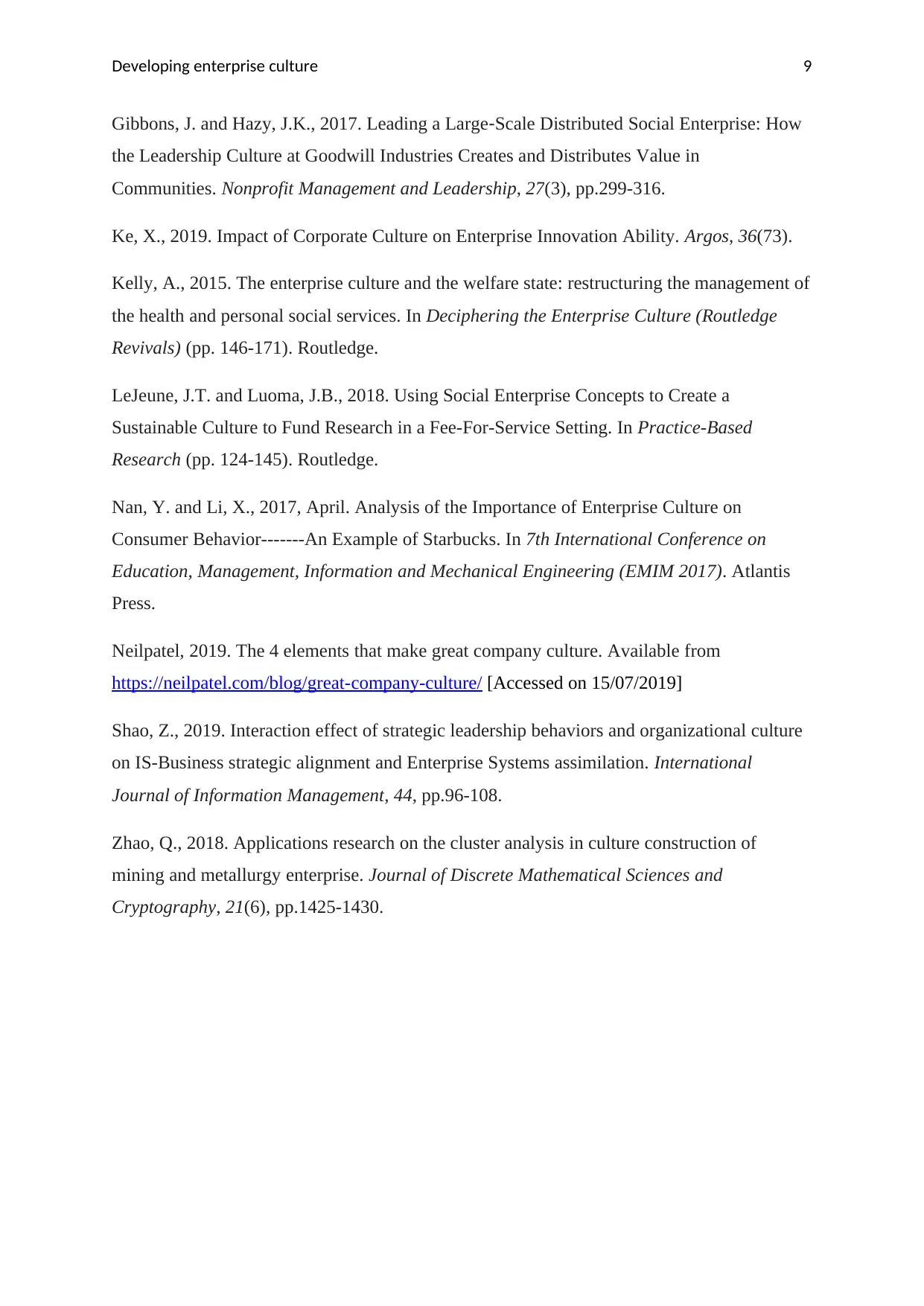
Developing enterprise culture 9
Gibbons, J. and Hazy, J.K., 2017. Leading a Large‐Scale Distributed Social Enterprise: How
the Leadership Culture at Goodwill Industries Creates and Distributes Value in
Communities. Nonprofit Management and Leadership, 27(3), pp.299-316.
Ke, X., 2019. Impact of Corporate Culture on Enterprise Innovation Ability. Argos, 36(73).
Kelly, A., 2015. The enterprise culture and the welfare state: restructuring the management of
the health and personal social services. In Deciphering the Enterprise Culture (Routledge
Revivals) (pp. 146-171). Routledge.
LeJeune, J.T. and Luoma, J.B., 2018. Using Social Enterprise Concepts to Create a
Sustainable Culture to Fund Research in a Fee-For-Service Setting. In Practice-Based
Research (pp. 124-145). Routledge.
Nan, Y. and Li, X., 2017, April. Analysis of the Importance of Enterprise Culture on
Consumer Behavior-------An Example of Starbucks. In 7th International Conference on
Education, Management, Information and Mechanical Engineering (EMIM 2017). Atlantis
Press.
Neilpatel, 2019. The 4 elements that make great company culture. Available from
https://neilpatel.com/blog/great-company-culture/ [Accessed on 15/07/2019]
Shao, Z., 2019. Interaction effect of strategic leadership behaviors and organizational culture
on IS-Business strategic alignment and Enterprise Systems assimilation. International
Journal of Information Management, 44, pp.96-108.
Zhao, Q., 2018. Applications research on the cluster analysis in culture construction of
mining and metallurgy enterprise. Journal of Discrete Mathematical Sciences and
Cryptography, 21(6), pp.1425-1430.
Gibbons, J. and Hazy, J.K., 2017. Leading a Large‐Scale Distributed Social Enterprise: How
the Leadership Culture at Goodwill Industries Creates and Distributes Value in
Communities. Nonprofit Management and Leadership, 27(3), pp.299-316.
Ke, X., 2019. Impact of Corporate Culture on Enterprise Innovation Ability. Argos, 36(73).
Kelly, A., 2015. The enterprise culture and the welfare state: restructuring the management of
the health and personal social services. In Deciphering the Enterprise Culture (Routledge
Revivals) (pp. 146-171). Routledge.
LeJeune, J.T. and Luoma, J.B., 2018. Using Social Enterprise Concepts to Create a
Sustainable Culture to Fund Research in a Fee-For-Service Setting. In Practice-Based
Research (pp. 124-145). Routledge.
Nan, Y. and Li, X., 2017, April. Analysis of the Importance of Enterprise Culture on
Consumer Behavior-------An Example of Starbucks. In 7th International Conference on
Education, Management, Information and Mechanical Engineering (EMIM 2017). Atlantis
Press.
Neilpatel, 2019. The 4 elements that make great company culture. Available from
https://neilpatel.com/blog/great-company-culture/ [Accessed on 15/07/2019]
Shao, Z., 2019. Interaction effect of strategic leadership behaviors and organizational culture
on IS-Business strategic alignment and Enterprise Systems assimilation. International
Journal of Information Management, 44, pp.96-108.
Zhao, Q., 2018. Applications research on the cluster analysis in culture construction of
mining and metallurgy enterprise. Journal of Discrete Mathematical Sciences and
Cryptography, 21(6), pp.1425-1430.
Paraphrase This Document
Need a fresh take? Get an instant paraphrase of this document with our AI Paraphraser
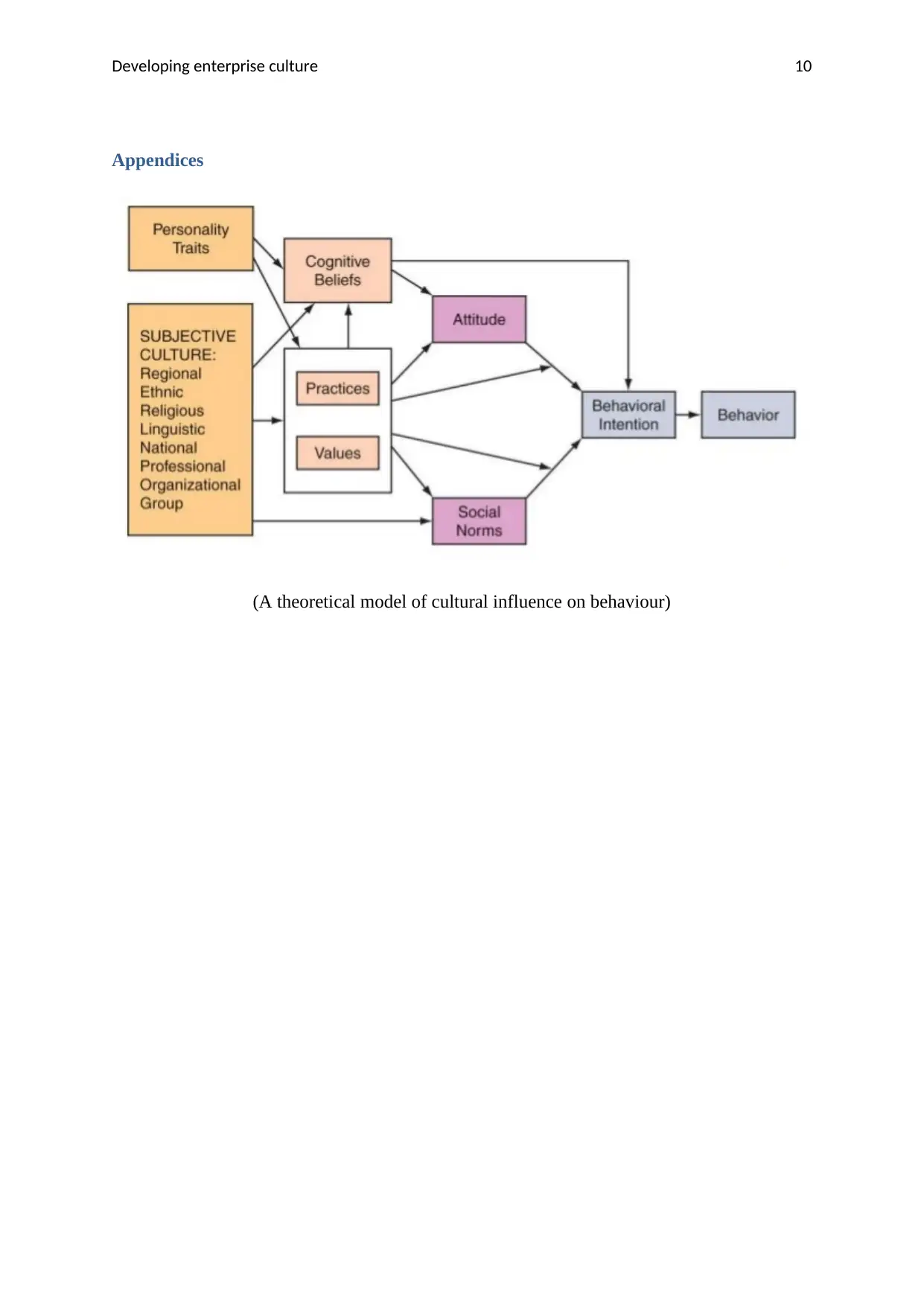
Developing enterprise culture 10
Appendices
(A theoretical model of cultural influence on behaviour)
Appendices
(A theoretical model of cultural influence on behaviour)
1 out of 11
Related Documents
Your All-in-One AI-Powered Toolkit for Academic Success.
+13062052269
info@desklib.com
Available 24*7 on WhatsApp / Email
![[object Object]](/_next/static/media/star-bottom.7253800d.svg)
Unlock your academic potential
Copyright © 2020–2026 A2Z Services. All Rights Reserved. Developed and managed by ZUCOL.





